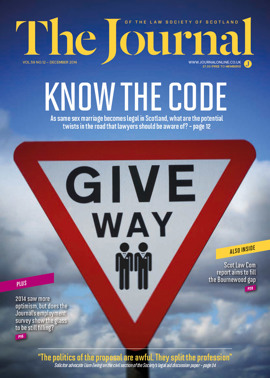Power talking
No doubt everyone in Scotland is now aware that the Smith Commission has published its report, setting out heads of agreement for devolving further powers to the Scottish Parliament. The report is commendably brief at just 28 pages, though that may, of course, be because the short timescale didn’t allow for anything longer.
The key recommendations on tax had been broadly trailed, and are:
- devolving to Holyrood the power to set the income tax rates and bands applying to earned income (i.e. not income from savings or dividends) of Scottish taxpayers (a term already defined in the Scotland Act 2012), with the revenue therefrom going to the Scottish Government – the personal allowance, tax reliefs and the definition of the tax base will remain reserved;
- allocating a share of “Scottish” VAT revenues (“receipts raised in Scotland by the first 10% of the standard UK VAT rate”, however those are to be defined) to the Scottish Government;
- and devolving air passenger duty and the aggregates levy.
The Scottish Government’s borrowing powers are also to be expanded, though the report leaves that to be agreed between the Scottish and UK Governments.
Certain aspects of the tax proposals may sow the seeds of future controversy, such as the need to design a mechanism for reducing the block grant in light of the new tax powers (particularly given the report’s requirement that the mere act of further devolution should make neither Scotland nor the rest of the UK worse off). Statements to the effect that the UK and Scottish Governments should each bear the costs (or reap the rewards) of their own policy decisions may also prove challenging, given the difficulty in attributing particular revenue increases or shortfalls to particular policies.
Away from taxation, the report proposes significant new responsibilities for the Scottish Parliament in areas such as:
- control over Scottish Parliament and local government elections (including adding 16 and 17-year-olds to the franchise in time for the 2016 election), subject to any changes to the Parliament’s own franchise, electoral system or member numbers requiring a two-thirds “super majority”;
- the management of, and proceeds from, the Crown Estate’s Scottish economic assets;
- the power to create new benefits in devolved areas and make “top-up” payments in any area of welfare, plus devolution of benefits that support the elderly, carers, the disabled and the ill. The new universal credit will remain reserved, though the Scottish Parliament will be able to vary the housing cost element and certain administrative aspects (such as the frequency of payments and paying landlords directly for housing costs);
- the administration of all tribunals (including employment tribunals) except the Special Immigration Appeals Commission and Proscribed Organisations Appeals Commission;
- the licensing of onshore oil and gas extraction;
- power to require the Competition & Markets Authority to carry out a phase 2 market investigation further to a market study carried out at the Scottish Government’s request;
- powers over consumer advocacy and advice, and to “prevent the proliferation” of payday loan shops and fixed-odds betting terminals.
Lord Smith also used his foreword to recommend some changes outside the scope of his remit, including greater devolution from the Scottish Parliament to local communities; improving oversight of the Parliament; and improving the “relatively weak [public] understanding of the current devolution settlement”.
The UK Government has undertaken to publish draft clauses implementing the report’s proposals by 25 January 2015. Note the reference to draft clauses rather than a full draft bill, which may be a gesture of sympathy towards whichever poor draftsman ends up being tasked with turning these (in some cases quite vague) proposals into statutory language within that timescale. A bill will then be introduced in the next Parliament following May’s general election, though if no party wins a majority its precise form could become an issue in negotiations over who will form the Government (particularly if there is a large SNP contingent seeking more than the Commission has proposed). The constitution may therefore remain high on the agenda for a good while yet.
The Smith Commission has recommended a potentially significant package of reforms to the scope of the Scottish Parliament’s powers. It will take time for these changes to be enacted and then actually come into effect, and it may of course be a good while longer before the Scottish Parliament actually legislates in many of the relevant areas. There is nevertheless significant food for thought as to what potential changes might come further down the line.
In this issue
- Factors in the balance
- Balancing the right to decide
- Life yet in oil and gas
- Commercial awareness begins at trainee stage
- Relocation and the finances of contact
- Reading for pleasure
- Opinion: Archie Maciver
- Book reviews
- Profile
- President's column
- Up and running at last
- People on the move
- With this Act, I thee wed
- Tax: a mission to inform
- For better, for worse
- Filling the Bournewood gap
- Power talking
- For whose aid?
- Balanced view
- A laughing matter?
- Directors: how much is too much, or not enough?
- Credit where it's due?
- New age, new image, new media, continuing problems?
- Scottish Solicitors Discipline Tribunal
- Lawyers as leaders
- Property Law Committee update
- Property Standardisation Group update
- Over the finishing line – 2
- Not proven no more?
- Vulnerable clients guidance now extended to the young
- From the Brussels office
- Take it to the schools
- A future – a vision
- Ask Ash
- A strategy with legs?
- Who's got what it takes?
- I can act, but should I?
- Prominence unplanned






